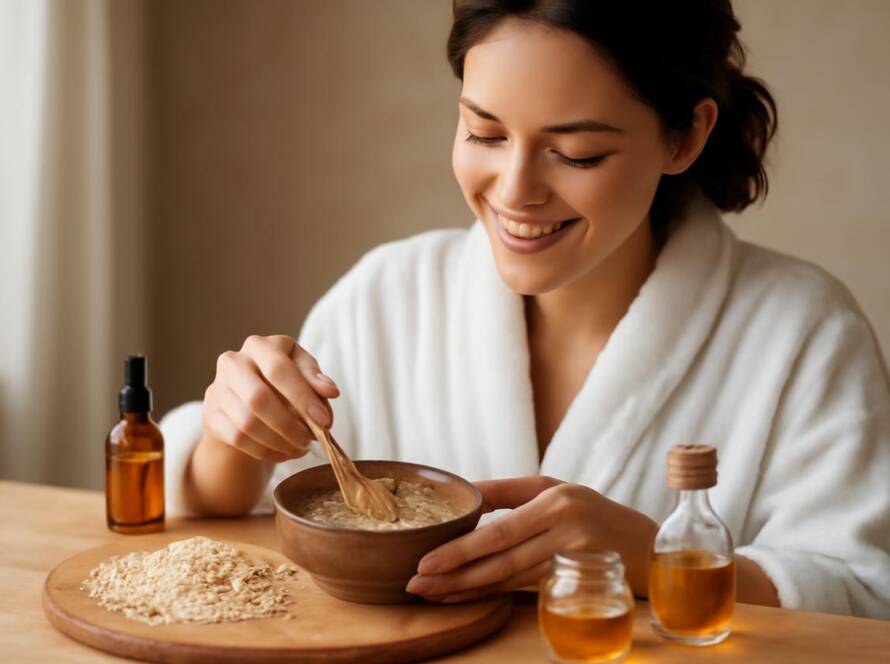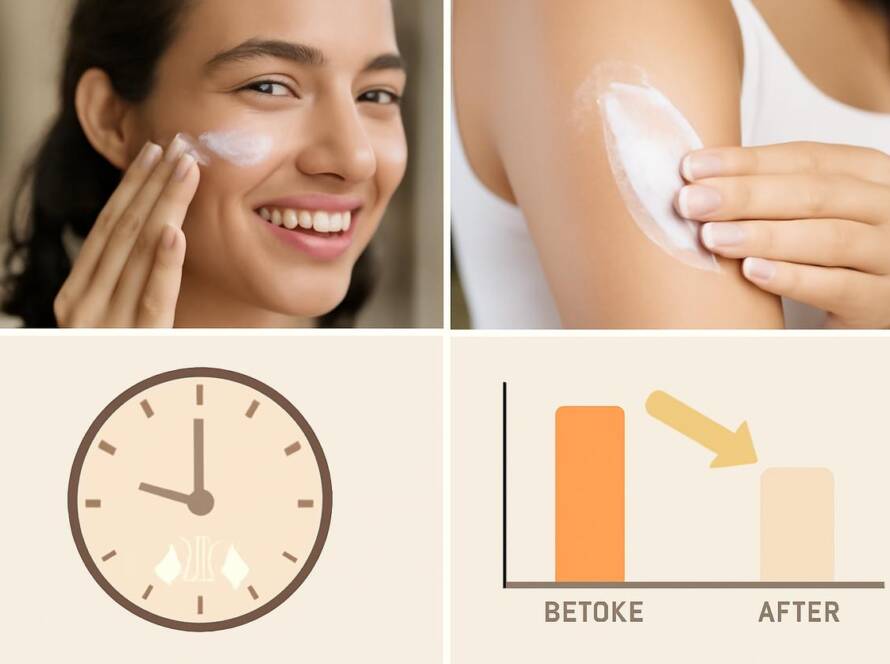Table of Contents
- Why Choose Gentle Natural Skin Care?
- How Your Skin Works: The Basics of Barriers, Oils, and Concerns
- Safety First: Patch Tests, Allergies, and Professional Advice
- Top Gentle Natural Ingredients and What They Do
- A Simple Daily Routine Using Natural Ingredients
- DIY Recipes for a Complete Natural Skincare Routine
- Customization Tips for Your Skin Type
- Common Myths About Natural Skin Care Remedies Debunked
- Troubleshooting: What to Do About Irritation or Breakouts
- When Natural Remedies Are Not Enough
- References and Further Reading
Why Choose Gentle Natural Skin Care?
In a world of complex ingredient lists and 10-step routines, many are turning back to basics. The appeal of natural skin care remedies lies in their simplicity and connection to nature. By using ingredients sourced from plants, foods, and minerals, you can create a gentle, nourishing routine that supports your skin’s health without overwhelming it. This approach focuses on working *with* your skin, not against it, providing hydration, soothing inflammation, and delivering essential nutrients in a straightforward way. As we look toward 2025 and beyond, the trend of mindful, sustainable beauty continues to grow, making this the perfect time to explore the effective world of natural skincare.
How Your Skin Works: The Basics of Barriers, Oils, and Concerns
To effectively use natural skin care remedies, it helps to understand the organ you are treating. Your skin is more than just a surface; it’s a complex and dynamic system with a primary goal: protection.
At the forefront is the skin barrier (or stratum corneum). Think of it as a brick wall: the skin cells are the “bricks,” and lipids (natural fats) are the “mortar” holding them together. A healthy barrier is crucial for keeping moisture in and harmful irritants, pollutants, and bacteria out. When this barrier is compromised, skin can become dry, red, itchy, and prone to issues. Many natural ingredients work by supporting and reinforcing this vital shield. For an in-depth look at its function, you can explore comprehensive skin barrier research.
Your skin also produces its own natural oil, called sebum. Sebum is essential for keeping skin moisturized and protected. However, an imbalance—too much or too little—can lead to common concerns like oily, acne-prone skin or, conversely, dry, flaky skin. Gentle natural care aims to balance sebum production rather than stripping it away completely.
Safety First: Patch Tests, Allergies, and Professional Advice
Just because an ingredient is natural does not mean it is universally safe for everyone. Plants, nuts, and pollens are common allergens, and your skin can react to them. Before applying any new ingredient or DIY recipe to your face, performing a patch test is non-negotiable.
How to Perform a Patch Test
- Apply a small amount: Dab a tiny bit of the ingredient or mixture on a discreet area of skin, like your inner wrist or behind your ear.
- Wait and watch: Leave the area alone for at least 24 to 48 hours. Do not wash it off if possible.
- Check for a reaction: Look for any signs of redness, itching, swelling, or blistering. If you experience any of these, wash the area immediately and do not use the ingredient on your face.
If you have known allergies (like to nuts or pollen), be extra cautious with oils and plant-based ingredients. Always prioritize your skin’s safety. If a severe reaction occurs, or if you have a persistent skin condition, it is always best to consult a board-certified dermatologist.
Top Gentle Natural Ingredients and What They Do
The foundation of effective natural skin care remedies is high-quality ingredients. Here are some of the most trusted, gentle, and scientifically-backed options to start with.
Ingredient Spotlight: Aloe Vera, Honey, Oatmeal, Coconut Oil, and Rosehip Oil
- Aloe Vera: Known as the “plant of immortality,” aloe vera gel is a powerhouse of hydration and healing. It contains vitamins, enzymes, and amino acids that soothe sunburn, reduce inflammation, and provide lightweight moisture. Its anti-inflammatory properties are well-documented in scientific reviews on aloe vera. It is especially beneficial for sensitive or irritated skin.
- Honey: A natural humectant, honey draws moisture from the air into your skin. Raw or Manuka honey is also prized for its antibacterial and anti-inflammatory properties, making it excellent for acne-prone skin and promoting wound healing. Research highlights its effectiveness as a therapeutic agent for skin conditions.
- Oatmeal: Specifically colloidal oatmeal (finely ground oats suspended in liquid), this ingredient is a champion for calming distressed skin. It contains compounds called avenanthramides, which have potent anti-inflammatory and anti-itch properties. It is a go-to for conditions like eczema and general sensitivity, with its benefits confirmed in studies on oatmeal in dermatology.
- Coconut Oil: This oil is rich in fatty acids, making it an excellent emollient for locking in moisture, especially for dry skin on the body. However, it is comedogenic (can clog pores), so those with oily or acne-prone skin should use it with caution or avoid it on the face.
- Rosehip Oil: Extracted from the seeds of rose bushes, this oil is packed with vitamins A and C and essential fatty acids. It is celebrated for its ability to help reduce the appearance of scars, correct dark spots, and hydrate dry skin without feeling heavy.
A Simple Daily Routine Using Natural Ingredients
Consistency is more important than complexity. A simple, twice-daily routine can deliver fantastic results.
Morning Routine
- Cleanse: Use a gentle, non-stripping cleanser (like an oatmeal-based one) or simply splash your face with lukewarm water.
- Tone: Apply a soothing toner like rosewater to hydrate and balance your skin’s pH.
- Moisturize: Use a lightweight oil (like jojoba or rosehip) or a simple DIY moisturizer to hydrate and protect your skin for the day.
Evening Routine
- Cleanse: Thoroughly cleanse your face to remove makeup, dirt, and impurities from the day. An oil-based cleanser followed by a water-based one (double cleansing) can be effective.
- Treat (Optional 1-3 times a week): Apply a face mask targeted to your needs (e.g., a clay mask for oiliness or a honey mask for hydration).
- Moisturize: Apply a slightly richer moisturizer or facial oil to help your skin repair and regenerate overnight.
DIY Recipes for a Complete Natural Skincare Routine
Ready to get started? Here are four simple recipes using the ingredients discussed above. Always use fresh ingredients and make small batches to ensure potency.
Gentle Oatmeal and Honey Cleanser
Perfect for all skin types, this cleanser soothes while it cleans. Mix 2 tablespoons of finely ground oats (colloidal oatmeal) with 1 tablespoon of raw honey and a small amount of water to form a paste. Massage gently onto damp skin and rinse with lukewarm water.
Soothing Green Tea Toner
Green tea is rich in antioxidants and helps reduce inflammation. Brew a strong cup of organic green tea and let it cool completely. Pour it into a clean spray bottle and store it in the refrigerator for up to a week. Spritz on your face after cleansing.
Hydrating Aloe and Honey Mask
This mask is a drink of water for dry or irritated skin. Mix 2 tablespoons of pure aloe vera gel with 1 tablespoon of raw honey. Apply a thin layer to your face, leave on for 15-20 minutes, and rinse off.
Nourishing Shea Butter Moisturizer
For a rich, protective cream, melt 2 tablespoons of raw shea butter in a double boiler. Remove from heat and stir in 1 teaspoon of rosehip oil. Let it cool until semi-solid, then whip with a hand mixer until it becomes light and fluffy. Store in a clean, airtight jar.
Customization Tips for Your Skin Type
One of the best things about natural skin care remedies is how easily they can be adapted.
- For Oily or Acne-Prone Skin: Incorporate ingredients like bentonite or kaolin clay into masks to absorb excess oil. Add a single drop of diluted tea tree oil (a potent antibacterial) to your cleanser or moisturizer. Use lighter oils like jojoba or grapeseed.
- For Dry Skin: Choose richer oils and butters like avocado oil, shea butter, and cocoa butter. Honey and aloe vera are excellent for adding a layer of hydration before sealing it in with an oil.
- For Sensitive Skin: Stick to the basics. Colloidal oatmeal, aloe vera, and chamomile (as a tea toner) are your best friends. Avoid essential oils and potentially irritating ingredients. Always patch test.
- For Combination Skin: Practice “zone treating.” Apply a clay mask only to your oily T-zone (forehead, nose, and chin) and use a more hydrating mask or oil on your drier cheeks.
Common Myths About Natural Skin Care Remedies Debunked
Navigating the world of DIY skincare means separating fact from fiction.
- Myth 1: “If you can’t eat it, you shouldn’t put it on your skin.” While this is a nice sentiment, it is not always true. Ingredients like bentonite clay are fantastic for absorbing oil but are not meant for consumption. The skin digests and absorbs things differently than the stomach.
- Myth 2: “Natural remedies have no side effects.” False. As discussed, allergies and irritation are real possibilities. Poison ivy is natural, but you would not put it on your face. Research and patch testing are key.
- Myth 3: “Lemon juice is a great natural treatment for dark spots.” This is a dangerous myth. The high citric acid content in lemon juice is extremely harsh and can disrupt your skin barrier. It also causes phytophotodermatitis, a chemical burn that occurs when the juice on your skin is exposed to sunlight, leading to worse hyperpigmentation.
Troubleshooting: What to Do About Irritation or Breakouts
Sometimes, even with the best intentions, your skin may react negatively. If you experience redness, itching, or a rash after trying a new remedy, here is what to do:
- Stop using the ingredient immediately. Wash it off gently with cool water and a simple, trusted cleanser.
- Soothe the skin. Apply a cool compress or a layer of pure aloe vera gel to calm the inflammation.
- Go back to basics. For the next few days, use only your most basic, gentle products (or just water and a simple moisturizer) to allow your skin barrier to heal.
- Introduce new things one at a time. To identify the culprit, only add one new product or ingredient to your routine every few weeks.
If a breakout occurs, it could be a sign of pore-clogging (as with coconut oil for some) or a sensitivity. Follow the same steps to calm your skin and identify the cause.
When Natural Remedies Are Not Enough
Natural skin care remedies are wonderful for maintaining healthy skin and addressing mild, common concerns. However, they are not a substitute for professional medical advice or treatment. It is time to consult a board-certified dermatologist if you experience:
- Severe, persistent, or cystic acne.
- Chronic skin conditions like severe eczema, psoriasis, or rosacea.
- Any skin lesion that is changing in size, shape, or color.
- Signs of a skin infection, such as pus, extreme pain, or warmth.
A professional can provide an accurate diagnosis and create a treatment plan that may include prescription medications or procedures, ensuring you get the care you need.



